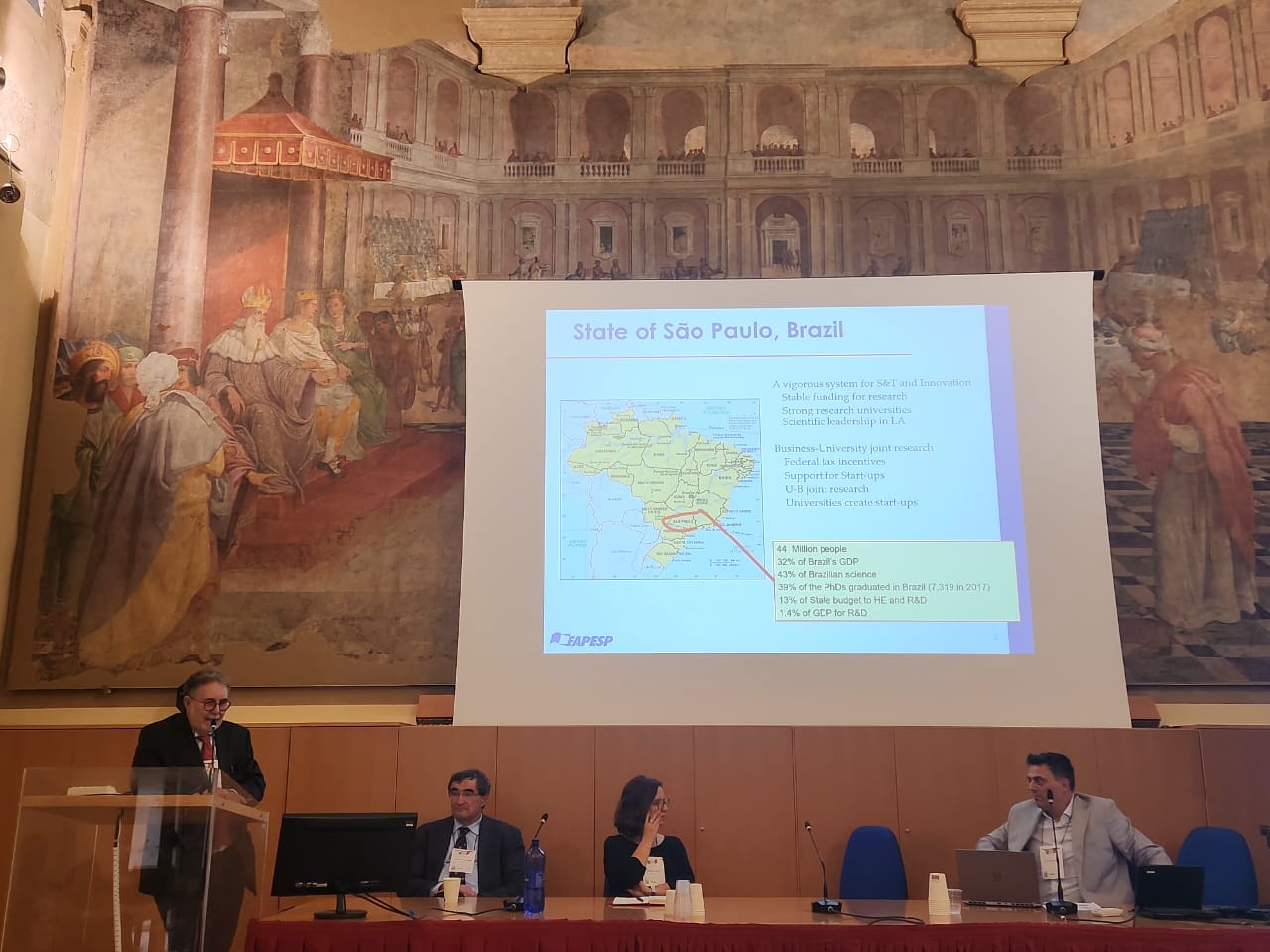


Carlos Américo Pacheco, FAPESP’s executive director; Claudio Melchiorri, from UNIBO; Marina Silverii, executive director of ART-ER and Shiva Loccisano, AlmaCube’s CEO (photo: Karina Toledo/Agência FAPESP)
Published on 10/16/2024
By Karina Toledo, from Bologna | Agência FAPESP – Initiatives aimed at promoting innovation and collaboration with industry were one of the highlights of the FAPESP Week Italy program. The topic was discussed on the afternoon of October 14th in a panel that brought together Carlos Américo Pacheco, FAPESP’s executive director, Marina Silverii, executive director of Attractiveness Research Territory Emilia-Romagna (ART-ER), and Claudio Melchiorri, Delegate for relations with businesses and industrial research at the Università di Bologna (UNIBO). The session was coordinated by Shiva Loccisano, technology and innovation expert and CEO of AlmaCube, UNIBO’s incubator and innovation hub.
In his speech, Pacheco gave an overview of the science, technology and innovation ecosystem in the state of São Paulo, pointing out that the region accounts for 32% of Brazil’s gross domestic product (GDP) and 43% of the national scientific production. He also said that the state has strong research universities, six of which are public, as well as stable funding and innovative companies.
“Half of the R&D [research and development] is done in companies. This is unique in Latin America, where most research is funded with public money,” he said.
After explaining that FAPESP’s mission is to fund research in all areas of knowledge, Pacheco presented the Foundation’s main initiatives to promote innovation, highlighting the FAPESP Innovative Research in Small Businesses Program (PIPE), the Research Partnership for Technological Innovation Program (PITE) and the Engineering Research/Applied Research Centers (ERCs/ARCs).
“These three modalities aim to create new companies, foster technological innovation in the state of São Paulo and promote the competitiveness of the São Paulo economy. All these possibilities are open to collaboration with the University of Bologna. We’re very open to discussing this cooperation,” he said.
Silverii then spoke about the role of ART-ER – a consortium that brings together universities, research institutes and development agencies – in shaping a sustainable future for the Emilia Romagna region, considered the “locomotive” of the Italian economy.
According to her, the entity’s mission is to promote internationalization, sustainable growth of the region through innovation, as well as attracting and retaining young talent.
“We’re the first region in Italy to establish a law aimed at attracting and retaining talent. Our innovation ecosystem began to take shape in 2000 and has grown. Various networks have sprung up under the coordination of ART-ER,” said Silverii, highlighting the following areas of focus: agribusiness; construction; mechatronics and automobiles; the health and wellness industry; the cultural and creative industry; sustainable development and energy; and innovation in services.
According to Silverii, most of the 400,000 companies based in the Italian region have fewer than nine employees. “Many are highly innovative and have a global market. This highly technological network allows for a great deal of applied industrial research. We have technopoles in the main cities, where there are incubators, laboratories and coworking spaces. And this network was formalized with the creation of regional innovation clusters,” she said. “Now all our energy is going into helping these companies scale up, and that means expanding international cooperation,” she stressed.
The Università di Bologna’s innovation and technology transfer strategies were the focus of Claudio Melchiorri’s presentation. With five campuses (Bologna, Cesena, Forlì, Ravenna and Rimini) and a branch in Buenos Aires (Argentina), UNIBO offers more than 200 degree courses across its 32 departments and five schools. It is home to a community of more than 90,000 students and 7,000 staff (half of whom are researchers and professors). It also has 15 interdisciplinary research centers, 50 cooperation agreements with industry and six with business associations, nine joint research laboratories, seven advanced vocational training schools for company employees (and offers courses for these employees), and more than 230 doctoral students funded by companies.
In his speech, the academic stressed that the presence of universities of excellence in a given region is crucial for the emergence of innovation hubs, citing the example of Silicon Valley (United States), as academic institutions can meet the needs of companies by providing the necessary knowledge. He also presented UNIBO’s strategies for fostering entrepreneurship among its students and facilitating technology transfer.
“Since 2012, we’ve launched 16 startups and 77 spin-offs. That’s between five and six new companies a year. They put the results of our research in the market and create new job opportunities and assets for the local economy,” he said.
Source: https://agencia.fapesp.br/53057